We surveyed 2,000 British adults on their sleeping habits from 24/2/22 - 1/3/22.
The respondents represent people from across the whole of the UK, and the regional/gender and age breakdown can be seen here:

Find out if you’re getting enough sleep.
Our Great British Sleep Survey reveals the sleeping habits of UK adults with some surprising results, our study is cited among some of the UK’s most reputable media as the most comprehensive sleep analysis in recent years. Our previous research in 2020 highlighted sleeping habits during the Covid-19 lockdown, but now, with restrictions lifting, we have updated the study to see what’s changed since then and in 2022.
The Covid-19 lockdown had an enormous impact on our everyday lives, but with restrictions lifting and some normality returning, we wanted to find out if the pandemic is still having a lingering effect on the average amount of sleep British people are getting.
We surveyed over 2,000 adults and found that sleeping patterns appear to also be returning to normal, as 57% of people said “I get the same amount of sleep on average”.
Just over a quarter of people (27%) are getting less sleep on average as a result of the pandemic, while a small percentage of the population (16%) are managing to sleep more on average during the last two years.
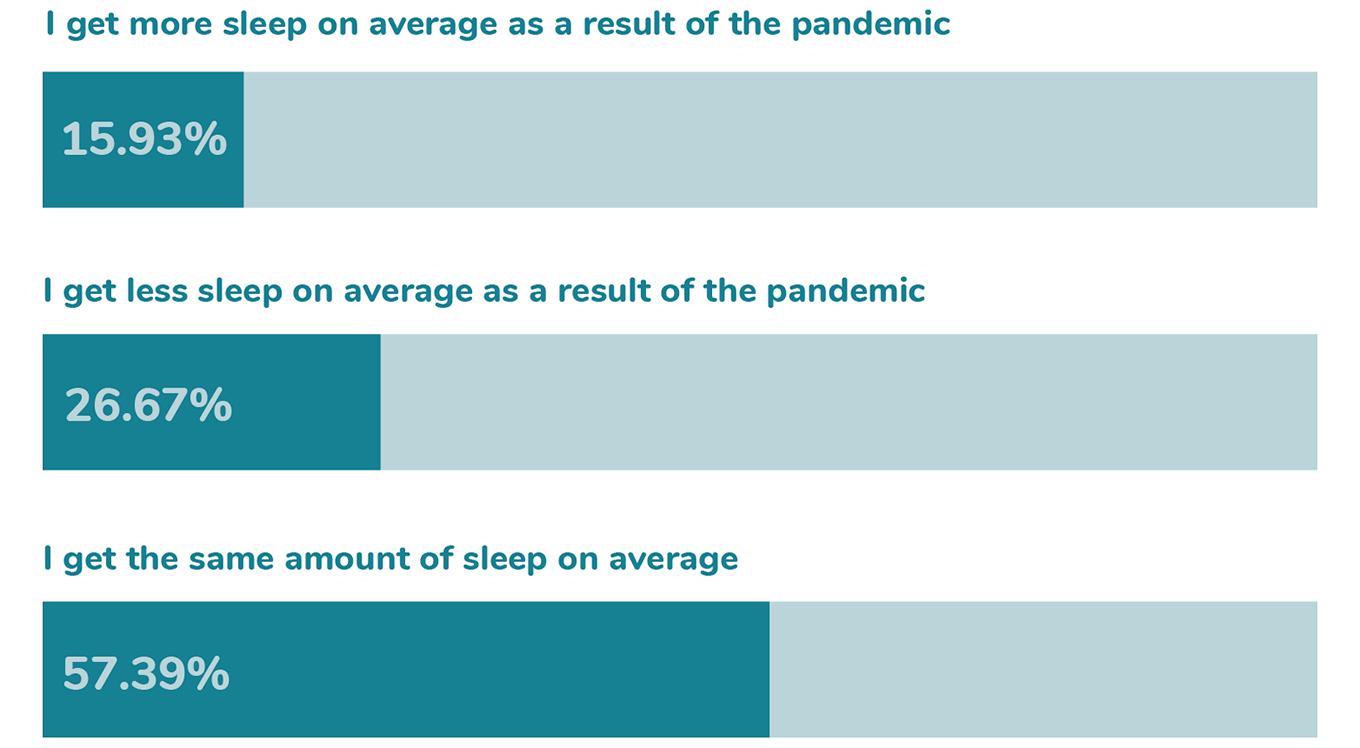
Of the statistics shown above, there were similar percentages in male and female answers:
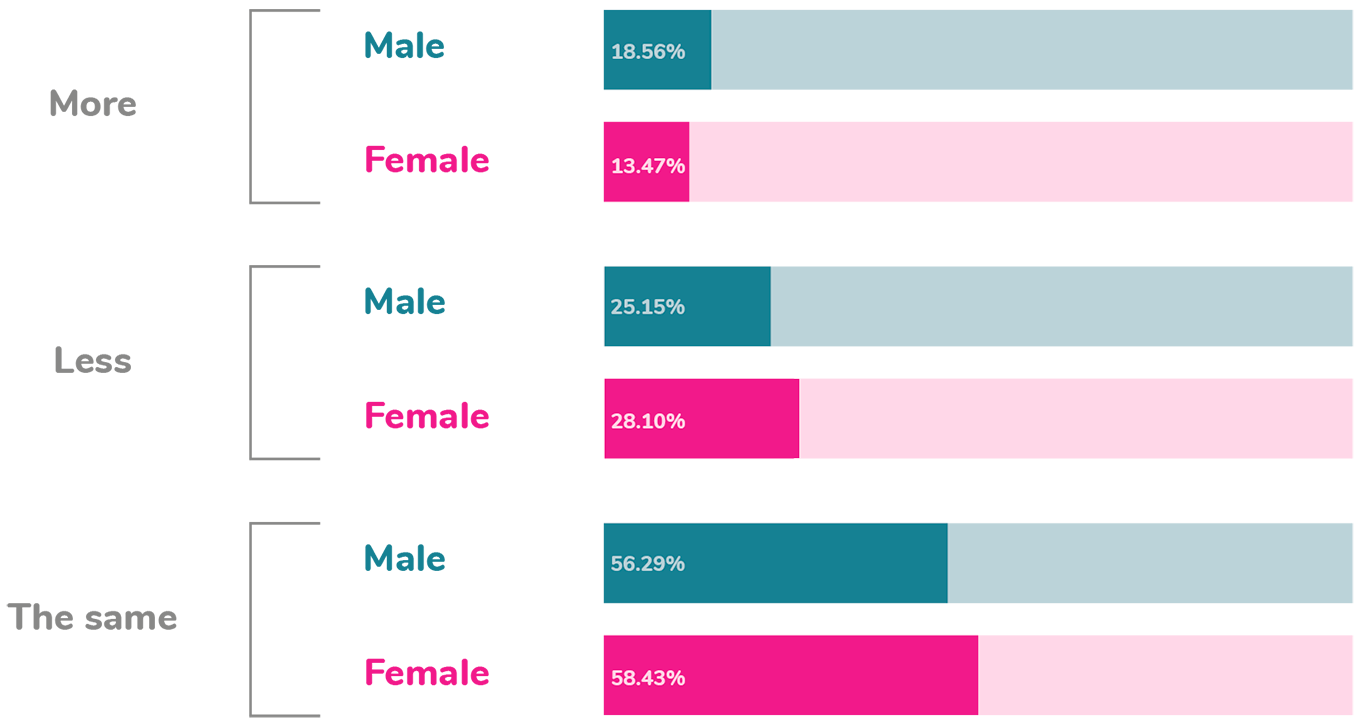
Our lives are getting ever busier, and sometimes taking care of ourselves can fall somewhat by the wayside. Earlier this year, the team at Chemist4U decided to act on our strong suspicion that people across the UK are often guilty of neglecting our sleeping patterns - so we surveyed 2,000 UK-based respondents on questions relating to their sleeping habits between 24th February and 1st March 2022 and compiled insightful sleep facts and statistics. 970 of those who engaged identified as male and 1,032 identified as female.
We surveyed 2,000 British adults on their sleeping habits from 24/2/22 - 1/3/22.
The respondents represent people from across the whole of the UK, and the regional/gender and age breakdown can be seen here:
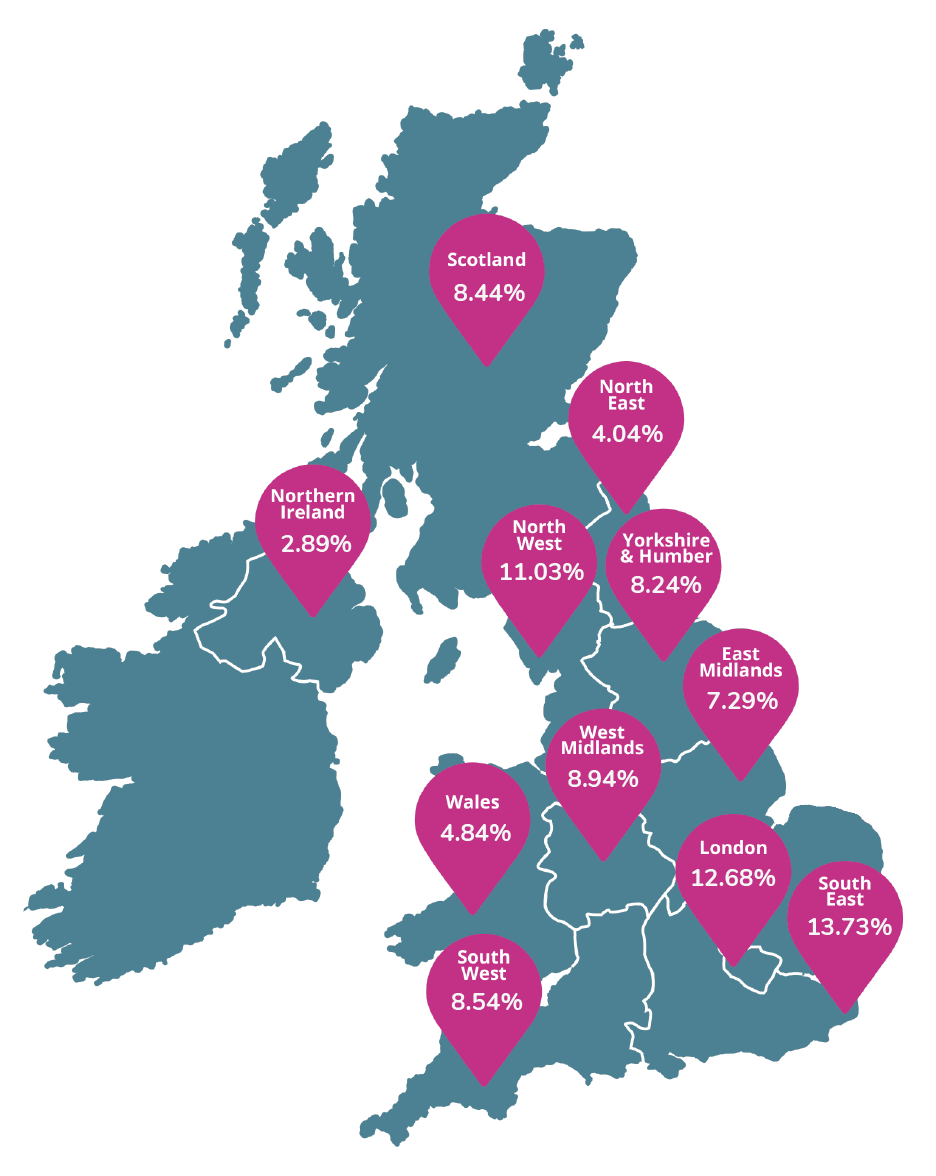
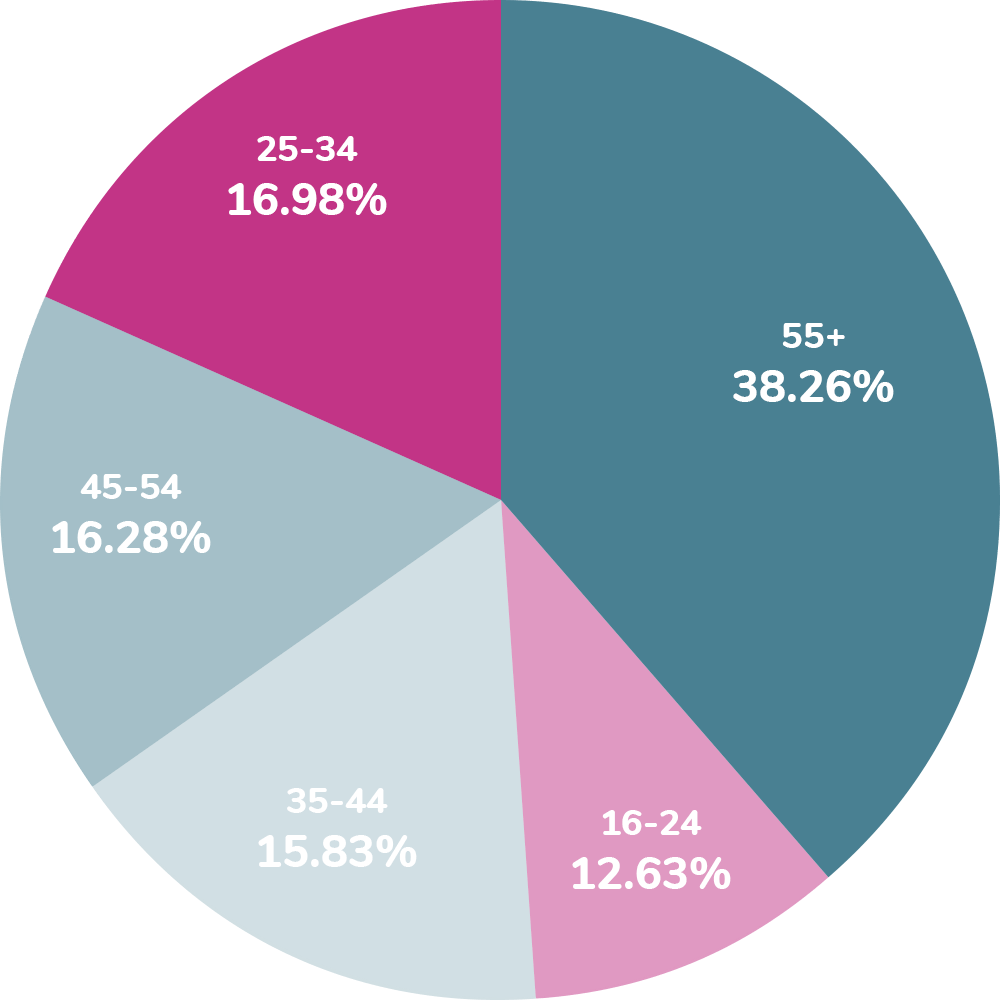
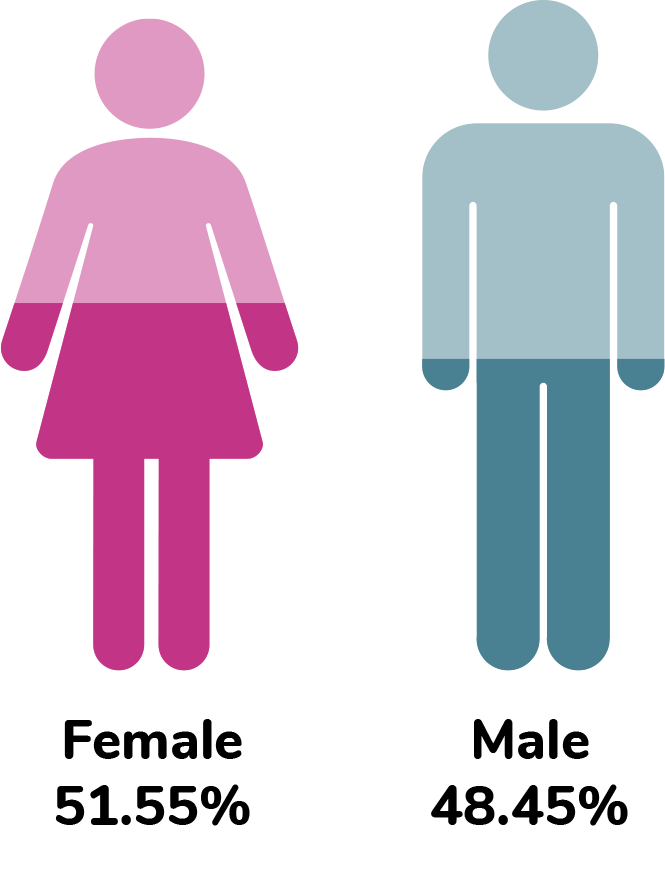

Despite the above sleep facts and statistics, people cited “too much caffeine” and “pets either on the bed or in the house” as the lowest ranking factors that kept them awake at night when questioned.
Day to day “stress and anxiety” came in at number one, with 28% saying this is the biggest factor that affects the quality of their sleep. However, the second-highest response was that “nothing keeps me up at night” suggesting that just over a fifth of Brits are getting good quality sleep.
28% of respondents said that “nothing helps me go to sleep”, suggesting that over a quarter of those surveyed have trouble falling asleep.
The most popular bedtime routine to help the nation get to sleep, and had the second-highest response rate, was “reading before bed (25%), followed by “watching a movie/series (18%).
A common response to also come from our survey results is the use of sleeping aids to help the nation sleep at night. 2021 saw more than half a million prescriptions for Zopiclone - a medicine used to help treat difficulty sleeping.
Over the past 24 months, searches for sleeping tablets have increased by 49%, with monthly results within the region of 27,000 in 2022. This could be as a result of the recent pandemic impacting the nations ability to have a good night's sleep.
It came as no surprise to us to discover that the average UK resident fails to achieve the recommended 8 hours of sleep per night. Our survey informed us that the average adult in the UK sleeps for just 6 hours and 10 minutes per night.
We found that the average adult male in the UK gets around 7.8 minutes more sleep per night than females. Our survey found that males in the UK averaged 370.2 minutes (6.17 hours) of sleep per night with females averaging 362.4 minutes (6.04 hours). Across the entire year, this works out at around 47.45 more hours.
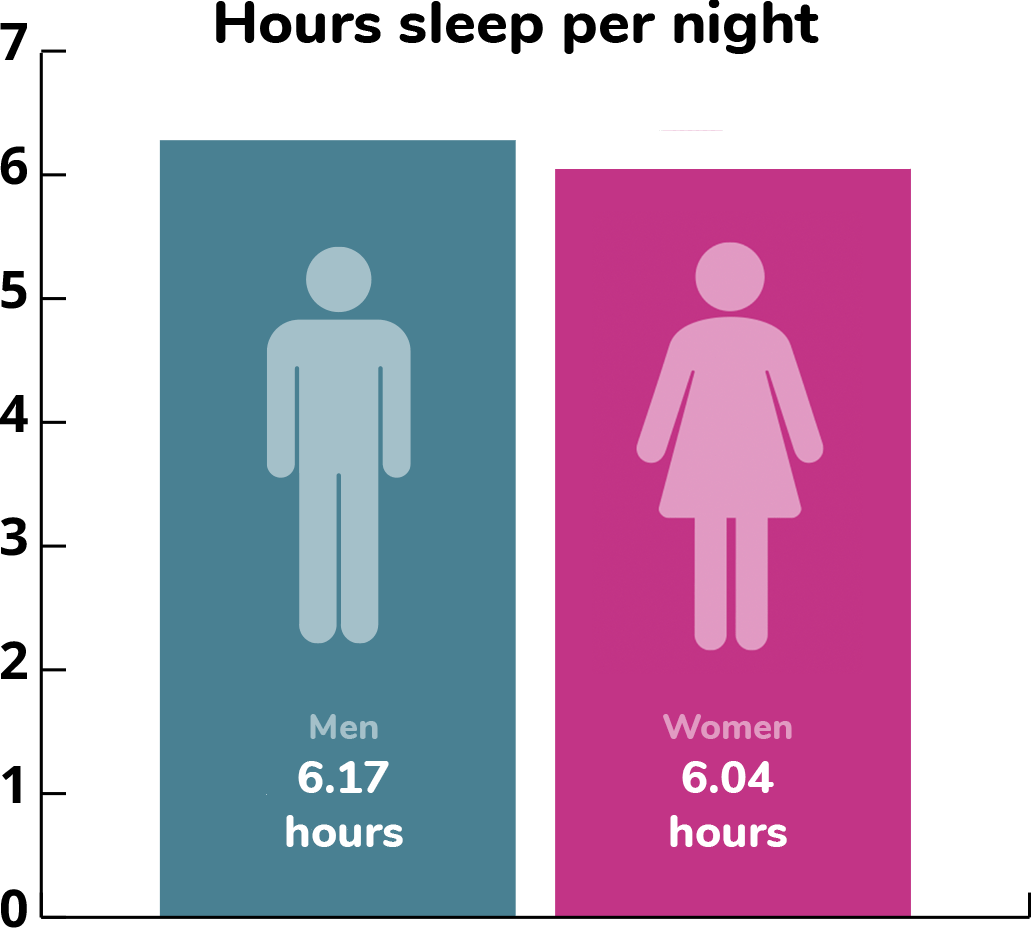
Not getting enough sleep won’t just make you feel grumpy or groggy in the morning, but it can have more serious side effects over time. The correlations between a lack of sleep and your concentration, memory and mood are well known, but you could also be leaving yourself vulnerable to conditions like type 2 diabetes and coronary heart disease if you neglect your nightly rest.
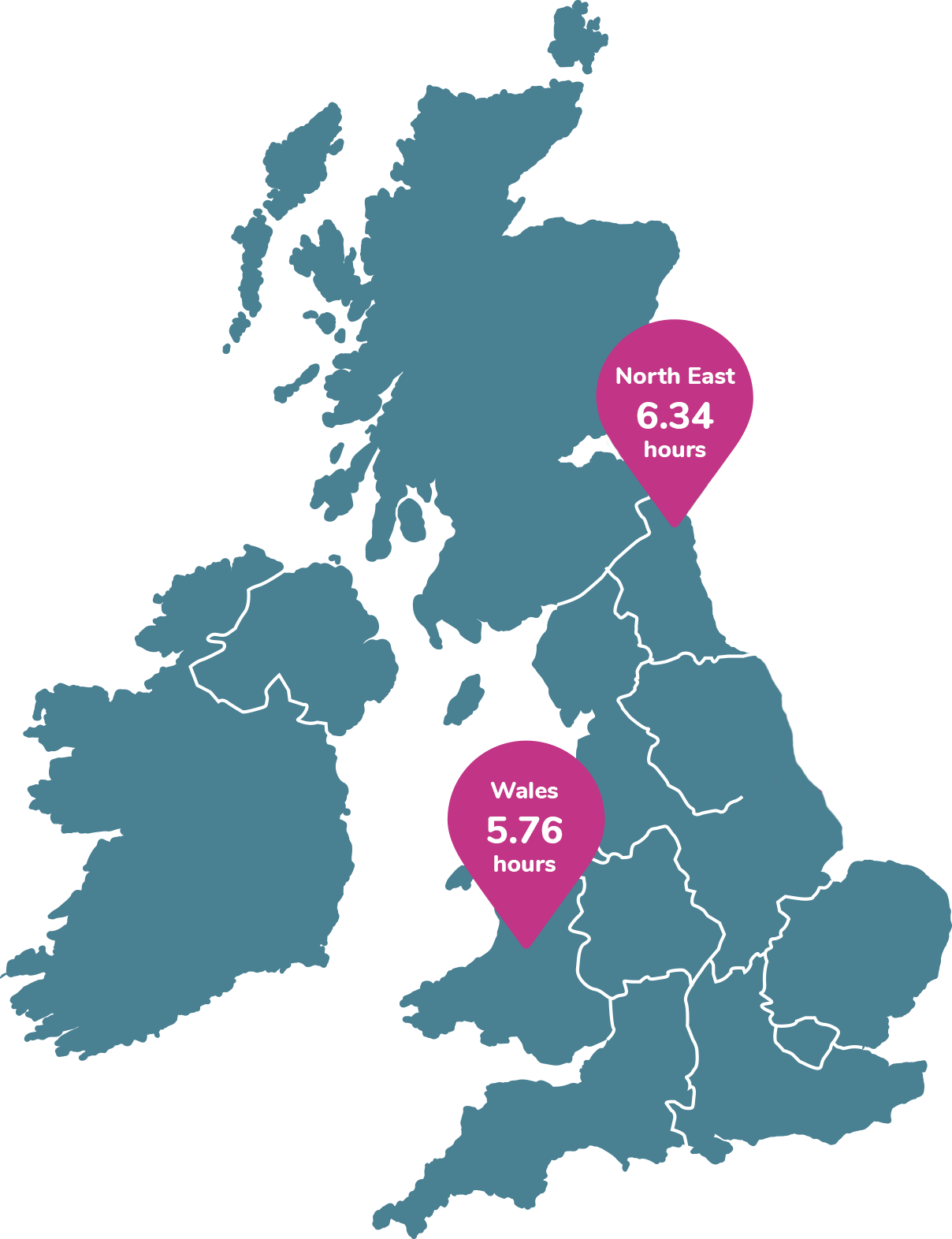
It turns out that the North East can boast the greatest amount of sleep, with the average resident getting their head down for 6.34 hours per night.
Welsh respondents, however, said they slept for a full 58 minutes less than this on average - only snatching 5.76 hours each night.
Our survey revealed that the most sleep-deprived age group is 35-44 year-olds. Averaging 5.81 hours of sleep per night, this is 2.19 hours less than the recommended 8 hours.
It was found that almost 8% (7.39%) of UK residents only achieve between 3 - 4 hours of sleep per night.
You might be amazed to discover that, according to our survey, almost 23% of us only get between 5 and 6 hours of sleep per night.
Our previous research discovered that nearly 15% of us spend more than an hour per week watching television in bed, while only 10.65% said they spend the same amount of time talking to their partner and just over 7% told us they get intimate for this length of time per week.
In fact, more than 35% of us would rather sleep alone than with a partner.
For more information please email digital@chemist-4-u.com.
In our 2018 survey, we found that men are 10% more likely than women to prefer sleeping with their other half, rather than sleeping alone. Meanwhile, women are 27% more likely to sleep in pyjamas than men, who have an overall (38%) preference to sleep naked.
16% of pet owners admit to letting their pet sleep in their bed every night, while just 8% of parents let their child sleep in their bed every night, indicating that, as a nation, we might be softer on our pets than our kids.
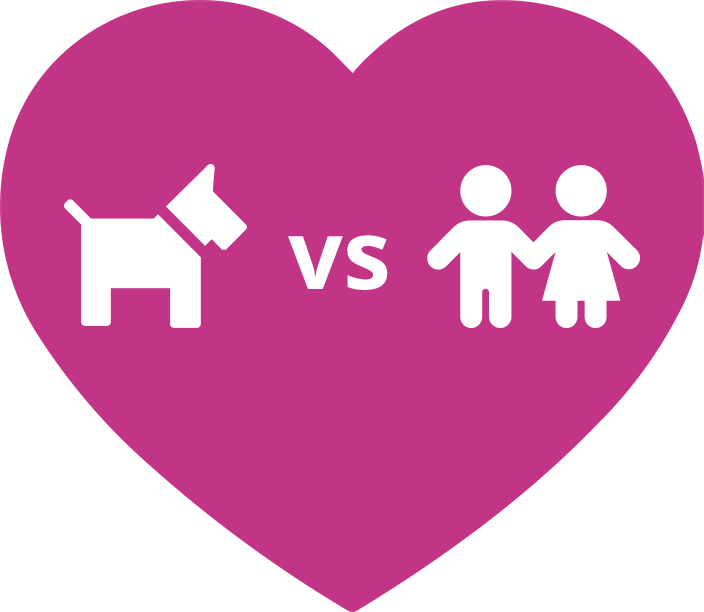
1 in 10 couples who live in the same household admit to sleeping in separate beds every night.

Our 2022 survey found that just over 1 in 5 of respondents (21%) said they argue with their spouse around sleeping habits and the majority of those (53%) argue about “snoring”, followed by “tossing and turning” (27%) as the second-highest source of disagreements. The third most common reason for arguments is due to the “time partner goes to sleep” (25%).
A new survey carried out by online pharmacy, Chemist 4 U, has revealed British adults’ preferred side of the bed. An overwhelming majority (65%) of all adults have a side of the bed they most like to sleep on:
Left
Right
Middle
No preference
As you’ll see below, our study tells us that the average person living in the UK sleeps for between 6.10 hours per night (a mean of 366 minutes). This means that many of us miss out on the recommended amount of sleep by at least 114 minutes.
2021’s Global Sleep Survey undertaken by Philips indicates that the average amount of sleep achieved worldwide by adults over the age of 25 is 7.3 hours.
This means that the average Brit is getting around 72 minutes less sleep a night than those in other countries. This adds up to 438 hours a year (or an incredible 18.25 days).
The situation in the UK is slightly better for under 25s, with our survey finding that they sleep on average 6.18 hours per night (a mean of 370.8 minutes). Recent research has found that parts of the brain are still developing up to the age of 25 so it is worrying that our younger generations are falling short of medical recommendations for sleep by 27.67 days per year (39,857 minutes).
Sweden ranks as the country that manages the least amount of sleep per night. In Zoma Sleep’s report, the average sleep was recorded at just 6 hours per night.
By contrast, the same report stated that Mexico got the most sleep - with Mexicans sleeping for 9 hours per night on average. According to the report, Mexico is the only country currently reported to exceed the recommended 8 hours of sleep per night.
Sleep.org informs us that it usually takes between 10 and 20 minutes for the average person to fall asleep. Taking longer is probably the result of getting too much sleep, suffering from stress or drinking too much coffee - while falling asleep very quickly may suggest you don’t get to bed early enough.
According to Huffington Post, the period of "grogginess" we experience between sleeping and feeling fully awake is known as "sleep inertia", and it means that some parts of your brain - most predominantly the prefrontal cortex - are still affected by sleep. This portion manages our self-control and our decision-making abilities, so if you find yourself trying to put your freshly-made coffee in the fridge instead of the milk, this is probably why.
Amazingly, the effect can last up to four hours - though the average person feels fully awake within just a quarter of an hour. You’ll experience sleep inertia to a higher degree if you don’t get enough sleep.
A “sleep cycle” refers to the amount of time it takes for your body to move into REM. We gradually sink into REM - the phase of sleep during which we tend to dream, as our body is not in a conscious state but our brain is “awake” - in stages. We then cycle back to an almost waking state, then descend into REM once more. This process takes 90 minutes on average each time, and it’s a good idea to use this as a basis for when you go to bed.
You should aim to think of your sleeping time in 90-minute increments - so if you go to bed at 10 pm (considering it takes around 15 minutes on average for a person to fall asleep) you should set your alarm for about 6.30 am.
In July 2019, Fine Bedding reported that bedtime for the average adult based in the UK is 10.43 pm.
From birth up to four years of age, it’s recommended that our children have consistent periods of sleep both during the day and at night. From four years onwards, we should be aiming for our little ones to achieve 11 hours and 30 minutes of nighttime sleep, according to the NHS. At 5, they should be getting 11 hours, then the time should be reduced by 15-minute increments year on year until they reach around 13 years old. From this point, they should sleep for around 9 hours per night until they reach adulthood, at which point the recommended 8 hours should be aimed for.
Between 10 and 11 pm is often considered to be the best time for adults to go to bed, as the body begins to produce less cortisol - the hormone commonly linked to stress - at this time. However, every person is different, with many preferring to go to bed earlier in autumn and winter and earlier in spring and summer due to the changing light.
The exact reason why we and other animals are programmed to enter an unconscious state once a day or so is still something of a scientific mystery. After all, throughout prehistory, doing so would have rendered us vulnerable to predators - so one would expect us to have “evolved away” from this tendency.
However, according to the National Sleep Foundation, we do know that sleep allows our bodies and brains to recover from the effects of the previous day - as well as helping us to form strong, lasting memories, build and repair muscle and tissue and ensure that our hormones are performing correctly.
The NHS tells us that it's extremely important for our health that we get the right number of hours of sleep each night. The majority of human beings function best after 8 hours, but this figure can vary from person to person. If we regularly miss out on the correct amount of sleep, the side effects can range from the unpleasant to the potentially life-threatening.
Possible health problems associated with poor sleeping patterns include:
...along with a heightened risk of:
The world has become a more stressful place in recent years, with the pandemic, rising household bills, and world events keeping many of us up at night. If this sounds familiar, you may want to consider speaking to your doctor or pharmacist about sleep aids, which can be used in the short term to help you get enough sleep and fall back into a regular sleep pattern.
So what do our surveys tell us about the particular sleeping habits of UK residents? Read on to find out.
From our previous survey in 2018, we looked into the relationship between being a parent and sleep.
On average, adults who have children get 34 hours less sleep per year than non-parents. Surprisingly, parents with just one child seem to sleep less than parents with two children, but the figure peaks at parents with four children, who get 104 hours less sleep a year than non-parents.
In our 2018 survey, we asked respondents how much of their annual salary/income they would be willing to sacrifice for an extra hour of sleep per night.
The results indicated that, on average, 35% of people would be willing to give up a portion of their salary for some extra snooze time.
Of those who would be willing to give up some of their salary, the average Brit would give up between £171.30 and £319.61 (mean £245.45) of their salary per year for an extra hour of sleep a night. This rises to £278.73 for those regularly getting less than 6 hours of sleep per night.
Billionaire Jeff Bezos has challenged the "sleep is for wimps" tycoons by insisting on a good night's rest. Other successful entrepreneurs have boasted that their ability to work long sleepless hours was the key to their wealth. We decided to use the survey data to find out how much sleep people with a variety of salaries get. Is less sleep the key to earning more? We looked at those under 55 to exclude retirees.
| Income | Minutes slept | Hours slept |
|---|---|---|
| No income | 350.9 | 5.84 |
| Under £25,000 | 377.5 | 6.29 |
| £25,001 - £49,999 | 378.9 | 6.31 |
| £50,000+ | 383 | 6.38 |
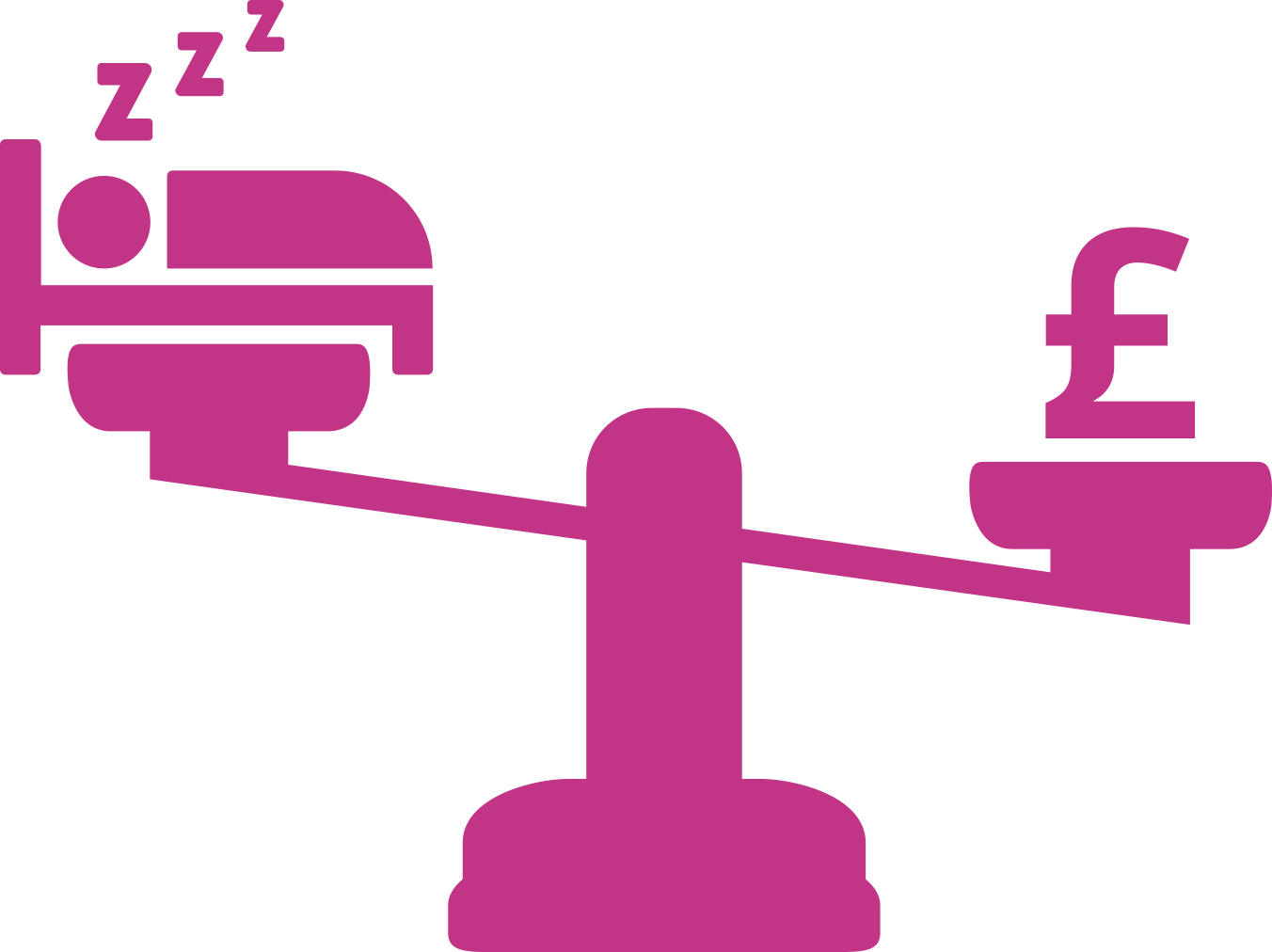
For more information please email digital@chemist-4-u.com.
It’s a worrying sign that some people in the UK are turning to alcohol to help them fall asleep, especially when you consider the estimation that over 600,000 people in England alone are alcohol dependent. With many safer alternatives to choose from, this is something we need to address as a nation.
James O’Loan, CEO and Prescribing Pharmacist, Chemist4U